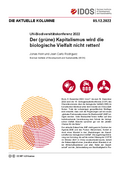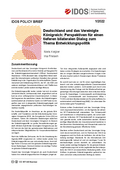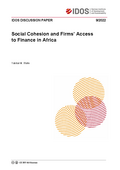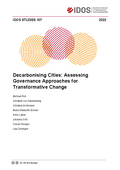-

Publikationen
Photo: www.shutterstock.com/de/image-photo/pont-du-gard-old-roman-aqueduct-45688924
Publikationen
Das German Institute of Development and Sustainability (IDOS) gibt vier eigenständige Publikationsreihen heraus. In Discussion Papers, Policy Briefs und Studies veröffentlichen die Wissenschaftler*innen des IDOS ihre aktuellen Forschungsergebnisse. Auch Gastwissenschaftler*innen und Kooperationspartner haben die Möglichkeit, ihre Forschungsergebnisse in einer der IDOS-Reihen zu publizieren. Publikationen der 2022 eingestellten Reihen Analysen und Stellungnahmen, Briefing Paper sowie Two-Pager / Zweiseiter sind weiterhin online verfügbar. Die vierte Publikationsreihe ist für Meinungsbeiträge vorgesehen: Regelmäßig kommentiert die Aktuelle Kolumne die neuesten Entwicklungen und Themen der internationalen Entwicklungspolitik.
Wissenschaftler*innen des IDOS veröffentlichen ihre Forschungsergebnisse zudem regelmäßig in referierten und nicht referierten deutschen und internationalen Fachzeitschriften und Publikationsreihen anderer Forschungseinrichtungen und Institutionen sowie bei renommierten Buchverlagen. Zusätzlich nutzen sie Blogs und Online-Plattformen der Partnerinstitutionen, um die Forschungs- und Beratungstätigkeit des Instituts einer interessierten Öffentlichkeit zu vermitteln.
Es wurden 9409 Ergebnisse gefunden. Zeige Ergebnisse 2421 bis 2430 von 9409.
-
Unfinished business: an appraisal of the latest UNDS reform resolution
-
Thematic connections of the Paris climate agreement and the 2030 Agenda
-
Strengthening integrated approach for promoting the SDGs: what role for the high-level political forum?
-
Klimapolitik als Investitionschance
-
Internationale Klimapolitik 2018: von Paris über Bonn nach Katowice
-
Does social trust affect public support for international trade? Insights from an experiment in Vietnam
-
Investing in the behavioural dimensions of transnational cooperation: a personal assessment of the Managing Global Governance (MGG) Programme
-
Klagen over sluiten kolencentrales is schijnheilig
-
Creating wealth without labour? Emerging contours of a new techno-economic landscape
-
Data for development: an agenda for German development cooperation













